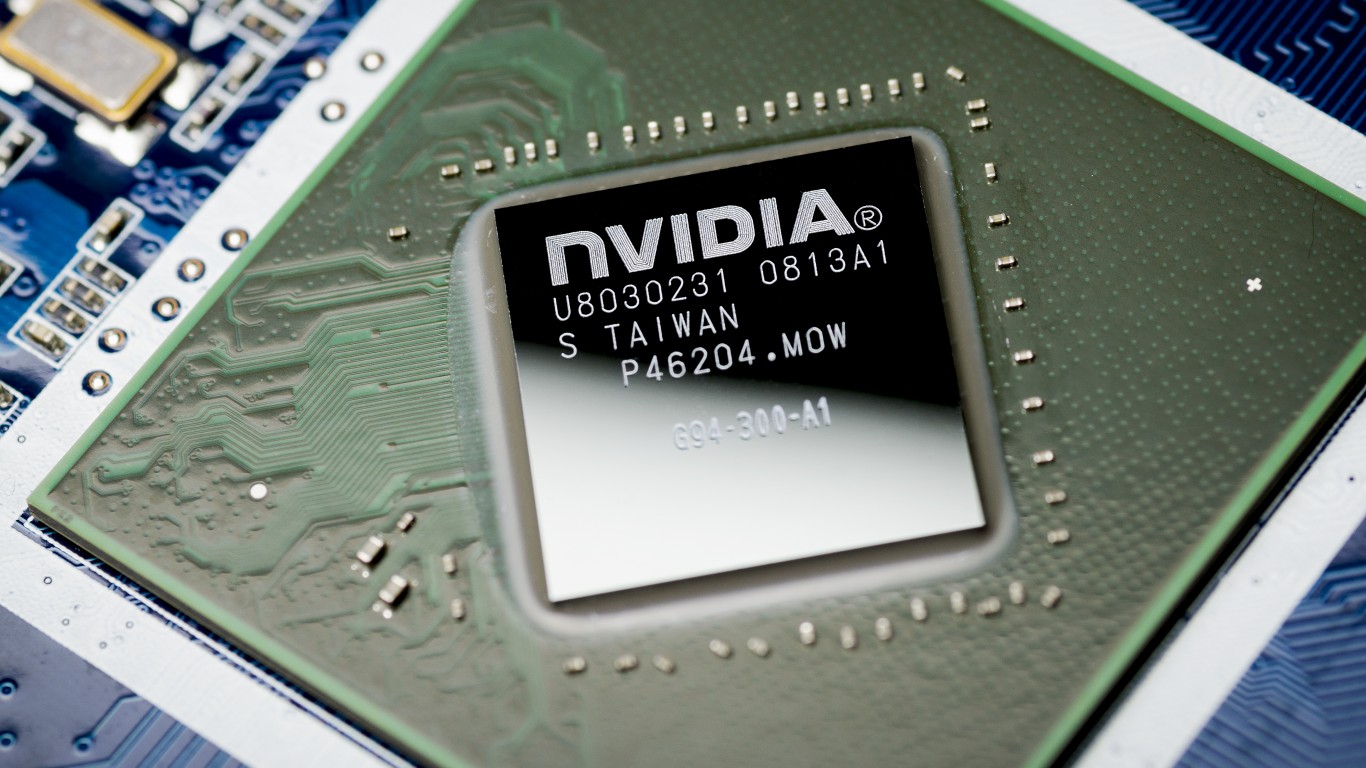Micron Technology Inc. (NASDAQ: MU) has had a solid week, with its shares bouncing handily on the heels of a reported $23 billion buyout offer from China’s Tsinghua Unigroup. There is just one problem, and that is not just that it may be a low-ball buyout offer. This proposed deal either will or should be blocked by U.S. regulators.![]()
24/7 Wall St. has a thought here that should seriously be considered, and it comes with an up-front admission that the odds of success would seem to be very low. Intel Corp. (NASDAQ: INTC) should make a matching bid for Micron, with a promise of matching any such bid by Tsinghua Unigroup. Admittedly, U.S. and international regulatory bodies almost certainly would be all over Intel, trying to block this effort. That being said, there have not yet been enough loud voices against a proposed Chinese chip-making giant buying Micron.
Another complication comes up as well here. Intel has a working collaboration with Tsinghua Unigroup. Intel even invested roughly $1.5 billion for what was reported as a 20% stake in Tsinghua Unigroup. Intel may worry that reaching for Micron could harm its relationship with the Chinese outfit. Again, a merger of this magnitude is larger than mere share prices.
What is at stake here in a proposed acquisition of Micron by China is not just an issue of national pride. It is an issue of national security. Micron is U.S.-based and has much of its operations and many of its more than 30,000 employees here inside the United States. It claims to have the broadest memory solutions portfolio in the semiconductor industry, and it says that it holds over 20,000 patents. Micron makes critical DRAM and flash memory that is used in electronics, personal computers, internal systems and just about everything short of a basic toaster or wind-up alarm clock. That involves military, defense, law enforcement, government, corporate and consumer electronics alike.
ALSO READ: 10 Stocks to Own for the Next Decade
This proposal also would have an implication for Altera Corp. (NASDAQ: ALTR). Intel is trying to acquire this programmable logic devices-maker for $54 per share in a deal valued at some $16.7 billion. If the deal goes through, then Altera will become a unit of Intel, targeting existing and new customer sales. Intel signaled that it will continue Altera’s support and development of ARM-based and power management products.
As of July, Intel did not seem to have an assured regulatory clearance in its effort to acquire Altera. The company said that it expected a period of six to nine months to close the deal, and that was more than six weeks ago. If Altera is being acquired for $54, then the current price of $50.30 indicates that there is at least some regulatory risk to the deal closing.
Back to regulatory deal risk: The desire for Tsinghua Unigroup to buy up Micron almost has to be challenged by U.S. regulators. The Chinese would not allow a U.S. technology giant to come into China and buy up one of its top technology players. The Chinese might block a deal like that out of pride or security, and they have laws about what foreign companies can really own in China.
Tsinghua Unigroup is a Chinese company that is part of what is considered to be China’s top science university, Tsinghua University. To make an easy reference, let’s just call this the MIT-equivalent of China. And let’s not overlook the notion that China owns and controls state assets and entities. In late 2013, Tsinghua Unigroup made two acquisitions, of Spreadtrum and of RDA Microelectronics. Those were even larger than its market cap, so where did the funds come from? It is no secret at all that China wants to have its own dominant technology sector.
ALSO READ: AMD and Intel Are 2 Very Different Companies
Effectively, this would lead to a mostly state-run Chinese chipmaker taking over the top U.S. memory maker. The take of 24/7 Wall St. is that, despite nearly certain regulatory efforts immediately rallying against it, it would be better to have a U.S. monopoly of Intel-Micron (or even Intel-Micron-Altera) than it would be to have a state-owned Chinese chipmaker holding all our chips.
The Committee on Foreign Investment in the United States (CFIUS), the chair of which is the Secretary of the U.S. Treasury, reviews transactions that could result in control of a U.S. business by a foreign person or entity to determine the effect of such transactions on the national security of the United States. Again, think of all the flash memory and DRAM that is inside of national security equipment, on top of everything else.
Now let’s consider another issue here. Jack Lew, Treasury Secretary, just met with the Chinese delegation in Washington for the seventh meeting of the Strategic and Economic Dialogue, which is targeted at strengthening bilateral economic cooperation between the United States and China. Was this acquisition offer for Micron brought up? Did China get a nod? Did China get told to back off? Or did China point out how much Treasury debt it holds?
Needless to say, a Chinese company effectively owning the last chipmaker of DRAM and flash that is truly a U.S. operation should be considered something in which there are huge national security risks. CFIUS has a mixed history here, but if you consider that chips are used in nearly every single piece of defense and security equipment in the United States and abroad, then Micron’s ownership and domicile should matter. Still, a report in Forbes indicated that the proposed acquisition from China could be approved.
ALSO READ: Cisco’s Daring $10 Billion Investment in China
While some may have real concerns, there is no assurance that CFIUS would attempt to block the deal. It allowed IBM to sell its PC business to Lenovo, but it blocked the Chinese from buying 3Com. Still, Hewlett-Packard recently announced the sale of a majority stake in its Chinese server, storage and technology assets for $2.3 billion to Tsinghua University (Tsinghua Holdings) to become H3C. Bloomberg said at the time that was the first major U.S. technology company to pass control to local owners since the government stepped up restrictions on foreign firms.
If Intel owned Micron it would be one massive powerhouse, even far more than it already is. The antitrust concerns would be massive if Intel was able to control every aspect of the chip and memory sector. Still, if you only had two choices, would you rather have a Chinese state-run outfit owning a prized asset like Micron or would you rather let a U.S. giant keep all of Micron’s technology, most of its employees and its intellectual property (more than 20,000 patents) in America?
In 2013 Micron acquired Elpida, which also has ties to China, despite being based in Japan. Micron’s announcement in February of 2013 said that the Chinese Ministry of Commerce gave antitrust clearance for Micron’s pending acquisition of Elpida. Here is what stood out the most: China’s approval was the last remaining antitrust pre-merger clearance required for completion of the transaction.
This question over whether Micron should go to China or stay put does not even address the price of the proposed buyout. The $23 billion implied purchase price would be at $21.00 per share. This also would be a crushing deal for many Micron shareholders, and it would be a low-ball buyout, if history and analyst values matter at all.
ALSO READ: The 6 Most Shorted Nasdaq Stocks
Trading at $19.60 or so, Micron has a 52-week range of $17.14 to $36.59, and its consensus analyst price target is $29.64. That means the average of all analysts covering Micron, even after they largely lowered their targets, value Micron at almost $30 per share.
For those Americans who may be concerned that China would own or control a critical company like Micron, CFIUS can be contacted by email at [email protected] or by phone at (202) 622-1860.
Thank you for reading! Have some feedback for us?
Contact the 24/7 Wall St. editorial team.



